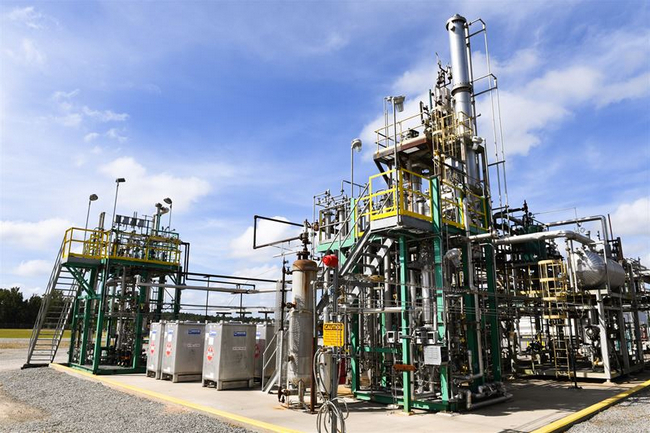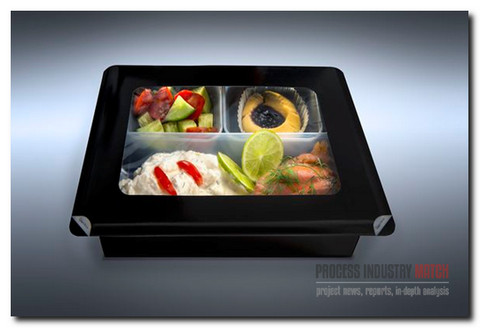Displaying items by tag: sas
SAS, Vattenfall, Shell and LanzaTech to explore synthetic sustainable aviation fuel production
Vattenfall, SAS, Shell and LanzaTech will together investigate the production of the world’s first synthetic sustainable aviation fuel (SAF) using the LanzaJetTM “Alcohol to Jet” technology on a large scale in Sweden. Instead of using virgin fossil material in the production process, the synthetic SAF will be produced from fossil free electricity and recycled carbon dioxide from district heating.
The goal is that a new production facility will produce up to 50,000 tonnes of synthetic SAF annually, provided that an investment decision is made at a later stage. The synthetic SAF, also known as electrofuel, will be produced from fossil free electricity and recovered carbon dioxide using the LanzaJet “Alcohol to Jet” technology, developed by LanzaTech and the U.S Department of Energy’s Pacific Northwest National Laboratory (PNNL). When full production is up and running it could provide SAS with up to 25 per cent of its global demand for sustainable aviation fuel in the 2030s.
A joint study has shown promising conditions for the project, and all partner companies now agree to carry out in-depth analyses. The ambition is to commission the new production facility sometime between 2026 and 2027 near Forsmark on Sweden's east coast.

"SAS and Sustainability go hand in hand. That’s why we are incredibly proud to be part of this unique project where ambitious sustainability goals and agendas come together. Our joint commitment in finding ways to enable large-scale production of a more sustainable aviation fuel is a fantastic opportunity to accelerate the commercialization of SAF, and thus SAS’s transition towards industry-leading zero-emission flights,” says Anko van der Werff, President and CEO, SAS.
"This initiative shows the potential of cross industry partnerships to drive the decarbonization of a hard-to-abate sector. To innovate faster in order to bridge to a fossil free living within one generation. This is a really good opportunity and together we will explore further how to produce low emission electrofuel for aviation,” says Anna Borg, President and CEO, Vattenfall.
"Sustainable aviation fuel offers the greatest potential to reduce emissions from aviation. It is only by working together today across the aviation ecosystem to drive the technologies and infrastructure needed to produce SAF at scale that the aviation sector can achieve net zero by 2050. This is why I am excited for this collaboration to explore one more pathway for SAF production,” says Anna Mascolo, President, Shell Aviation.
“The aviation sector faces incredible challenges getting the volumes of SAF needed for sustainable flight. This project is the start of delivering on these volumes and by reusing carbon dioxide and fossil free power we have an opportunity for unprecedented scale. We need to rethink carbon and together with fossil free power, harness it to create a new climate safe future for all,” says Jennifer Holmgren, CEO LanzaTech.
The aim of the project is to get the production of electrofuel started in Sweden. The companies have signed a Memorandum of Understanding and agreed that Vattenfall will investigate fossil free electricity supply, hydrogen production and carbon dioxide recovery. Shell will investigate fuel production, logistics and be the electrofuel buyer. LanzaTech will provide its gas fermentation expertise to make ethanol from the input gas streams and parties will license the LanzaJet “Alcohol to Jet” technology to convert the ethanol to electrofuel. SAS will participate as a potential buyer of the electrofuel.
Facts:
- Electrofuel is one type of SAF (Sustainable Aviation Fuel).
- In contrast to fossil feedstock, fossil free electricity, recycled carbon dioxide and water will be the only inputs to the process of making electrofuel. Electricity will mainly be used to make hydrogen via electrolysis. Carbon dioxide plus hydrogen can be converted by LanzaTech’s process into ethanol which is then converted via the LanzaJet Alcohol to Jet process to the aviation electrofuel.
- Rather than be released, the carbon dioxide from a district heating facility will be captured and used for electrofuel production. When electrofuel is combusted by aircraft engines, the captured carbon dioxide is released into the atmosphere after being utilized a second time. The raw materials planned to be used are fossil free electricity from the Swedish electricity grid and carbon dioxide collected from Vattenfall’s combined heat and power plant in Uppsala, where approximately 200,000 tonnes of carbon dioxide can be recovered per year.
- Today’s aircraft are certified to fly with a maximum of 50% SAF depending on production pathway and the remainder with traditional aviation fuel.
- Our annual planned SAF production of 50,000 ton would strongly contribute to the Swedish national targets of a fossil free domestic air travel and corresponds to about 30% of the needed Jet fuel to reach that target.
About Vattenfall
Vattenfall is a leading European energy company, which for more than 100 years has electrified industries, supplied energy to people’s homes and modernised our way of living through innovation and cooperation. We now want to make fossil-free living possible within one generation. That's why we are driving the transition to a sustainable energy system through initiatives in renewable production and climate smart energy solutions for our customers. We employ approximately 20,000 people and have operations mainly in Sweden, Germany, the Netherlands, Denmark and the UK. Vattenfall is owned by the Swedish state. For more information: corporate.vattenfall.se
About SAS
SAS, Scandinavia’s leading airline, with main hubs in Copenhagen, Oslo and Stockholm, flies to destinations in Europe, the USA and Asia. Spurred by a Scandinavian heritage and sustainable values, SAS aims to be the global leader in sustainable aviation. To achieve net zero carbon emissions on its domestic markets in 2030 and on a global level before 2050, SAS will, over the coming years, source a growing share of SAF, both through its self-supply at the main hubs but also through into-plane suppliers at the locations from which SAS operates. Further information is available at www.sasgroup.net
About Shell
Shell is an international energy company with operations divided across Upstream, Integrated Gas and Renewable and Energy Solutions and Downstream. We are partnering with customers, businesses, and others to address emissions, including in sectors that are difficult to decarbonise such as aviation, shipping, road freight and industry. Shell aims to produce around 2 million tonnes of SAF by 2025, and by 2030, it aims to have at least 10% of global aviation fuel sales as SAF.
About LanzaTech
LanzaTech harnesses the power of biology and big data to create climate-safe materials and fuels. LanzaTech has created a platform that converts waste carbon into new everyday products that would otherwise come from virgin fossil resources. LanzaTech’s first commercial scale gas fermentation plant has produced over 27M gallons of ethanol which is the equivalent of keeping over 130,000 metric tons of CO2 from the atmosphere. Additional plants are under construction globally. Further information is available at www.lanzatech.com.
New food packaging: The environment and stiffness ticked all the right boxes for SAS
Paperboard is a promising material for airline food packaging – it has low weight, can be barrier coated, and can be finished to the required level of elegance and quality feel. Scandinavian Airlines (SAS) has recently introduced a new food box made of the folding box board Incada.

“In creating packaging for inflight meals you must take many factors into account,” explains Gustaf Öholm, Senior Manager, Onboard Concepts, Services & Sales at SAS. “The packaging must have low weight, present the food well and feel good in the hand. It must be easy to open and of course it must preserve the intentions of our kitchen up until the food reaches the passenger.”
The airline’s previous solution was not good enough and SAS therefore decided to develop a new form of food packaging that could live up to the many quality and visual demands.
Important parameters included the feel of the material, the surface coating and the ability to colour the material.
The new food packaging is now being used for evening meals for passengers in SAS Plus on almost all routes outside the Nordic region. Another new feature is that all the contents – apart from one piece of chocolate – are now being produced at the same place by a dedicated team. SAS believes this will raise both the quality and quality consistency of the meals.
SAS’s packaging supplier worked together with Elanders, which previously developed a compostable packaging for Malmö Aviation that was also far lighter in weight. The SAS commission was to create packaging that is easy to use, has low weight and presents the food in an elegant way.
“We chose Incada from Iggesund because of its stiffness and we coated the inside with a barrier of black-dyed polyethylene. The packaging’s outside was printed black and we then put a lot of effort into finding a transparent film that captured a minimum of condensation in order to create the best possible visual impression of the food,” explains Tony Norén of Elanders.
Incada is made at Iggesund Paperboard’s mill at Workington, England. There, Iggesund has radically changed its energy supply from fossil natural gas to biomass. The mill’s new CHP power plant is the result of an investment of £108 million, and the reduction in fossil emissions is the equivalent of taking 65,000 cars a year permanently off the road.
“Of course the environmental aspect is also an important factor in our decision,” Gustaf Öholm concludes. “Obviously it’s important to us that our food packaging has a high standard from an environmental perspective.”
Iggesund
Iggesund Paperboard is part of the Swedish forest industry group Holmen, one of the world’s 100 most sustainable companies listed on the United Nations Global Compact Index. Iggesund’s turnover is just over €500 million and its flagship product Invercote is sold in more than 100 countries. The company has two brand families, Invercote and Incada, both positioned at the high end of their respective segments. Since 2010 Iggesund has invested more than €380 million to increase its energy efficiency and reduce the fossil emissions from its production.
Iggesund and the Holmen Group report all their fossil carbon emissions to the Carbon Disclosure Project. The environmental data form an integral part of an annual report that complies with the Global Reporting Initiative’s highest level of sustainability reporting. Iggesund was founded as an iron mill in 1685, but has been making paperboard for more than 50 years. The two mills, in northern Sweden and northern England employ 1500 people.
Further information:
Staffan Sjöberg
Public Relations Manager
This email address is being protected from spambots. You need JavaScript enabled to view it.
Iggesund Paperboard
SE-825 80 Sweden
Tel: +4665028256
Mobile: +46703064800
www.iggesund.com
